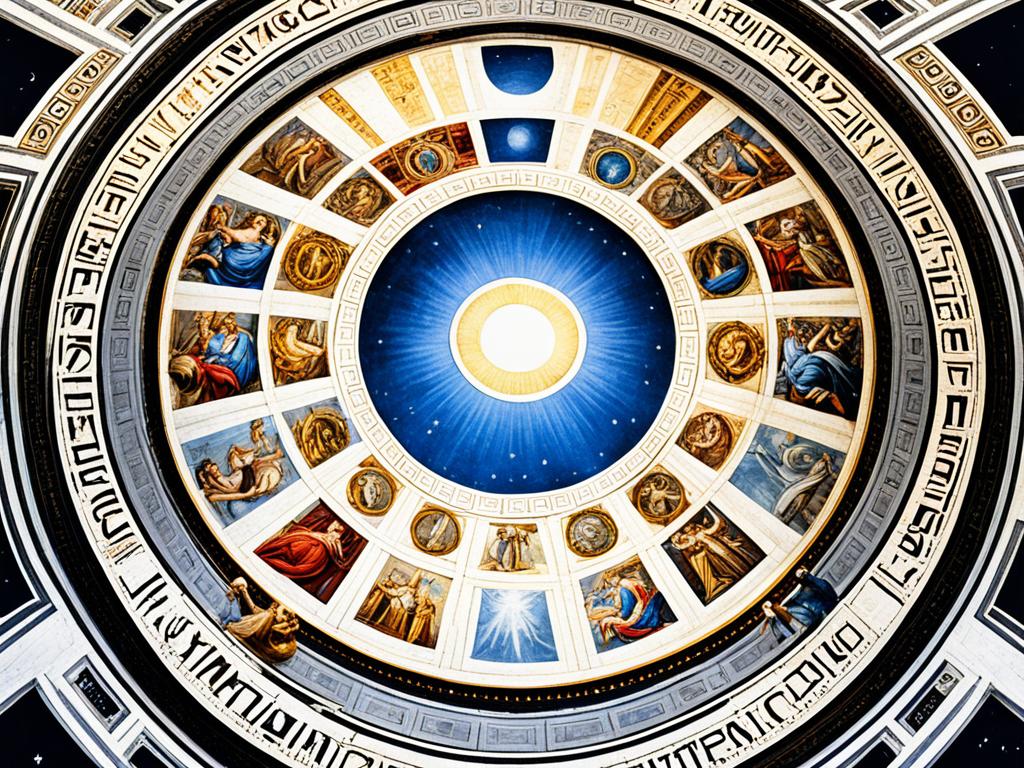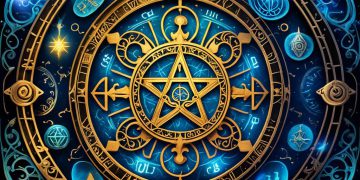Welcome to a world steeped in mythology and awe-inspiring tales. In this section, we will embark on a journey through the realm of the Greece Gods, also known as the Pantheon of Greek Gods. Prepare to be captivated by their significance, mythology, and the lasting influence they have had on Greek culture.
Key Takeaways:
- The Pantheon of Greek Gods holds immense importance in Greek culture and mythology.
- These divine beings have influenced various aspects of ancient Greek society, from religion to art.
- Exploring the myths and legends surrounding the Greek deities offers insight into their powers, personalities, and relationships.
- Ancient Greeks worshiped these gods in magnificent temples and practiced rituals to honor and seek their favor.
- The Greek gods played an active role in human affairs, impacting the lives of mortals through guidance, punishment, and protection.
Myths and Legends Surrounding Greek Deities
Delve into the captivating realm of Greek mythology, where a tapestry of myths and legends intertwine to shape the pantheon of Greek deities. These stories, passed down through generations, provide a glimpse into the complex and intriguing world of ancient Greece. From the mighty Zeus to the cunning Aphrodite, each deity possesses a rich mythology that contributes to their divine status. Let us explore the enchanting tales that have captured the imagination of countless generations.
One of the most prominent figures in Greek mythology is Zeus, the king of the gods. His mythological feats range from defeating the Titans to controlling the weather with his thunderbolts. Zeus’s stories highlight his incredible power and position as the ruler of Mount Olympus. Similarly, the goddess Hera, his wife and sister, is known for her vengeful and jealous nature, often punishing those who dared to cross her.
Another deity surrounded by myths and legends is Poseidon, the god of the sea. His stories depict his fierce temper and ability to command the oceans, while Aphrodite, the goddess of love and beauty, is renowned for her power to inspire desire and passion. These captivating tales weave intricate narratives of love, betrayal, and divine intervention.
The Greek deities were not just mythical beings but also personifications of various natural phenomena, emotions, and aspects of human life. For example, Athena symbolized wisdom and strategy, while Ares personified the spirit of war. These myths and legends not only entertained and intrigued the ancient Greeks but also offered explanations for the world around them.
“According to Greek mythology, the pantheon of gods and goddesses ruled over every aspect of human life. These deities embodied the hopes, fears, and desires of the ancient Greeks and served as a bridge between the mortal and divine realms.” – Greek Mythology Enthusiast
To further immerse yourself in the myths and legends surrounding Greek deities, explore the works of renowned ancient Greek poets such as Homer, whose epic poems “The Iliad” and “The Odyssey” continue to captivate readers to this day. These literary masterpieces showcase the intricacies of Greek mythology, bringing to life the gripping adventures and supernatural encounters of mortals and gods.
However, Greek mythology extends beyond literature and permeates various forms of art, including sculpture, painting, and pottery. These artistic expressions depict scenes from mythology, immortalizing the stories and breathing life into the divine beings. The intricate details captured in sculptures and the vibrant imagery in paintings serve as visual testaments to the enduring influence of Greek mythology on art throughout the ages.
| Greek Deity | Mythological Representation |
|---|---|
| Zeus | The mighty god of thunder and lightning. Ruler of Mount Olympus. |
| Hera | The goddess of marriage and childbirth. Known for her vengeful nature. |
| Poseidon | The powerful god of the sea. Controls the oceans and causes earthquakes. |
| Aphrodite | The enchanting goddess of love and beauty. Inspires desire and passion. |
| Athena | The wise goddess of wisdom, warfare, and strategic warfare. |
| Ares | The god of war and violence. Represents the destructive aspects of warfare. |
The myths and legends surrounding the Greek deities continue to fascinate and inspire, serving as a testament to their enduring impact on Greek society and culture. These stories offer a window into the lives of the ancient Greeks, revealing their beliefs, values, and aspirations. As you embark on this journey through Greek mythology, prepare to be captivated by tales of heroism, betrayal, and the intricate relationship between mortals and gods.
Temples and Worship Practices
Discover the awe-inspiring temples dedicated to the Greek Gods and the fascinating worship practices that thrived in ancient Greece. These magnificent structures served as sacred sanctuaries where devotees gathered to pay homage to their revered deities.
The temples were designed with meticulous attention to detail, reflecting the significant role of religion in Greek society. Their architecture was both grandiose and harmonious, embodying the belief that beauty was a divine quality.
A visit to these renowned temples was an esteemed pilgrimage for believers and a testament to their devotion. With intricate carvings, towering columns, and ornate decorations, these sacred spaces offered a transcendent experience that inspired worshippers.
Rituals and ceremonies held within these temples formed a vital part of religious worship. From offering sacrifices to performing sacred dances and reciting prayers, each act was an expression of reverence for the Greek Gods.
“The temples were not only places of worship but also centers of cultural, educational, and political activities. They fostered a sense of community and provided a platform for storytelling, philosophical discussions, and gatherings.”
The festivals devoted to the Greek Gods were vibrant and exuberant affairs, celebrated with great enthusiasm by the ancient Greeks. These gatherings brought people together in joyous revelry, honoring the deities and forging a collective sense of belonging.
Key Worship Practices:
- Pilgrimages to revered temples across Greece.
- Sacrifices of animals and valuable offerings.
- Sacred dances and processions.
- Prayers and hymns sung to honor and seek blessings.
- Festivals dedicated to specific deities.
The worship practices surrounding the Greek Gods were not limited to the grand temples alone. Domestic altars and household shrines were common, allowing individuals and families to offer their personal devotions and seek divine intervention in their daily lives.
The worship of the Greek Gods played a vital role in shaping the religious, cultural, and social fabric of ancient Greece. It was a profound expression of the belief in divine powers and a means to connect with the transcendental realm.
| Temple | Location | Deity | Significance |
|---|---|---|---|
| Parthenon | Athens | Athena | A magnificent Doric temple dedicated to the goddess of wisdom and war. It symbolizes the glory of Athens and is a testament to the city’s cultural achievements. |
| Temple of Zeus | Olympia | Zeus | One of the largest temples in Greece, renowned for its colossal statue of Zeus. It served as a sacred sanctuary and hosted the ancient Olympic Games. |
| Temple of Apollo | Delphi | Apollo | The spiritual center of ancient Greece, where the famous Oracle of Delphi made prophetic pronouncements. The temple marked the meeting point of earth and heaven. |
| Temple of Poseidon | Sounion | Poseidon | A majestic temple perched on a cliff overlooking the Aegean Sea. It honored the god of the sea and served as a navigational landmark for sailors. |
These temples and worship practices stood as a testament to the enduring devotion and profound spirituality of the ancient Greeks. They encapsulate the profound impact of the Greek Gods, not only as beings of mythology but as pillars of faith and inspiration throughout history.
The Role of Greek Gods in Human Affairs
Delve into the captivating world of ancient Greece and discover the profound role that Greek Gods played in shaping human affairs. These divine beings were not merely distant and aloof figures but active participants in the lives of mortals. Let’s explore the various ways in which they influenced and interacted with everyday individuals.
Guidance and Protection
The Greek Gods were believed to provide guidance and protection to those who sought their favor. Individuals would turn to different gods depending on their specific needs. For example, sailors would pray to Poseidon for a safe voyage, while warriors would seek the assistance of Ares in battle. The gods were seen as allies and sources of strength in times of difficulty, offering support and direction to those who sought their aid.
Punishment and Justice
Alongside their benevolent nature, the Greek Gods also imparted justice and punishment to those who defied them. Be it mortal or deity, no one was exempt from their wrath. The gods would intervene when they believed moral boundaries had been crossed, ensuring wrongdoings did not go unpunished. These acts of divine retribution served as a warning to mortals and reinforced the notion that the gods were ever-present and actively involved in human affairs.
“Beware mortal, for the wrath of the gods knows no bounds. Their judgment is swift and their punishments severe.”
Influence on Events
It was widely believed that the Greek Gods had the power to shape and influence major events. Their favor or disfavor could decide the outcome of wars, determine harvests, and even impact individual destinies. Mortals often sought to gain the gods’ favor through offerings, sacrifices, and prayers to ensure their desires aligned with the gods’ will. The belief in the gods’ ability to intervene in human affairs added an element of uncertainty and humility to the lives of ancient Greeks.
Fulfillment of Prophecies
The Greek Gods were also known for interacting with mortals through prophecies. Individuals would visit oracles seeking guidance and predictions of the future. These prophecies, often cryptic and enigmatic in nature, could shape the course of a person’s life. Mortals would make decisions and alter their actions based on the guidance received from the gods, understanding the profound influence and consequences associated with divine messages.
Thus, the Greek Gods played a multifaceted role in human affairs, from providing guidance and protection to punishing wrongdoings and shaping major events. Their impact on the lives of ancient Greeks was profound, shaping society, instilling moral values, and inspiring awe and reverence.
| God | Domain | Significance |
|---|---|---|
| Zeus | King of the Gods | Supreme ruler of Mount Olympus |
| Athena | Goddess of Wisdom | Patron deity of Athens |
| Aphrodite | Goddess of Love and Beauty | Believed to influence matters of the heart |
| Hades | God of the Underworld | Ruler of the realm of the dead |
| Hera | Goddess of Marriage | Protector of married women |
Greek Gods in Literature and Art
Immerse yourself in the captivating world of Greek Gods as they come to life in literature and art. From the epic poems of Homer to the exquisite sculptures and paintings, the Greek pantheon has inspired countless masterpieces throughout history.
Literary Treasures: Homer’s “Iliad” and “Odyssey”
When it comes to Greek mythology, no works are more iconic than Homer’s “Iliad” and “Odyssey”. These epic poems transport readers to a time of heroes, battles, and divine intervention. Through vivid storytelling, Homer weaves a tapestry of mythical gods and mortals, exploring the complex relationships and struggles between them. These timeless classics continue to be revered as literary masterpieces.
Iconic Sculptures and Paintings
The beauty and power of Greek Gods are immortalized in sculptures and paintings that have stood the test of time. From the serene marble statue of Aphrodite, the goddess of love, to the imposing figure of Zeus, the ruler of the gods, these artworks capture the essence and characteristics of each deity. Their graceful forms and intricate details showcase the skill and craftsmanship of ancient Greek artists.
“The true artist and the true poet inform us, and they alone, about the nature of the world as conceived by the ruling gods.” – Friedrich Nietzsche
Influence on Western Art and Literature
The influence of Greek Gods can be seen throughout Western art and literature. Renaissance artists drew inspiration from Greek mythology, infusing their works with mythological figures and themes. Similarly, authors such as William Shakespeare and John Milton incorporated Greek Gods and myths into their plays and poetry, adding depth and richness to their narratives. The enduring popularity of these artistic and literary works is a testament to the continued fascination with Greek mythology.
As you explore the realm of Greek Gods in literature and art, you’ll discover a world of imagination, beauty, and profound symbolism. Their stories and representations continue to inspire and captivate audiences across the globe, reminding us of the enduring power and influence of these timeless deities.
Conclusion
As we conclude our exploration of Greek mythology and the Pantheon of Greek Gods, it becomes clear that their influence has transcended time and continues to shape modern culture. From language and literature to art and architecture, the lasting impact of Greece Gods can be seen in various aspects of our lives.
The myths and legends surrounding these divine beings have captivated people for centuries, offering valuable lessons and moral guidance. The stories of Zeus, Hera, Poseidon, and Aphrodite, among others, not only entertained but also provided a deeper understanding of the human condition.
Greek mythology’s rich tapestry has inspired countless works of art and literature, from epic poems like Homer’s “Iliad” and “Odyssey” to sculptures and paintings that depict the gods’ majestic forms. Even today, their images grace museums and galleries, reminding us of the timeless beauty and power they represent.
With their lasting influence on language, literature, art, and architecture, the Greek Gods have undoubtedly left an indelible mark on human civilization. Their stories continue to be shared, studied, and celebrated, ensuring that their legacy endures for generations to come.







